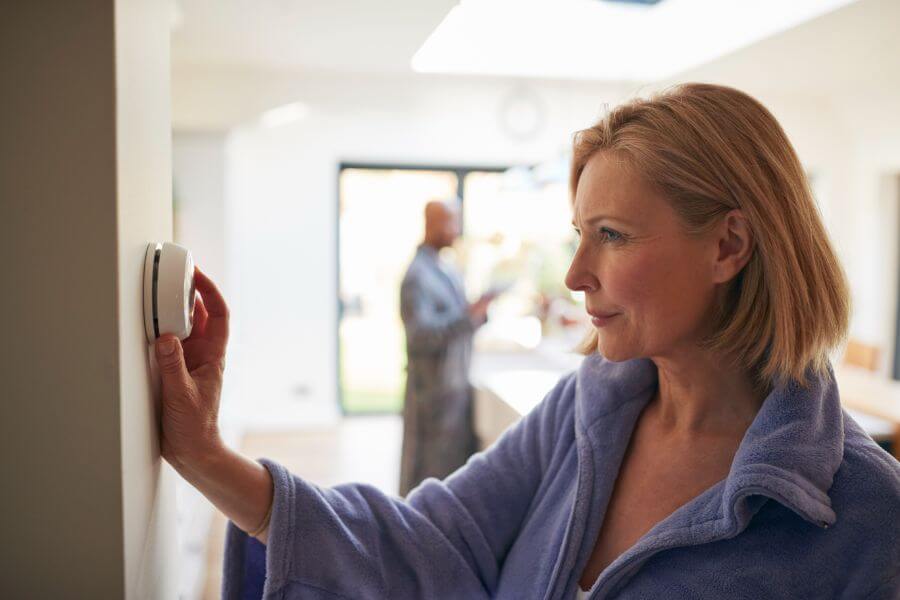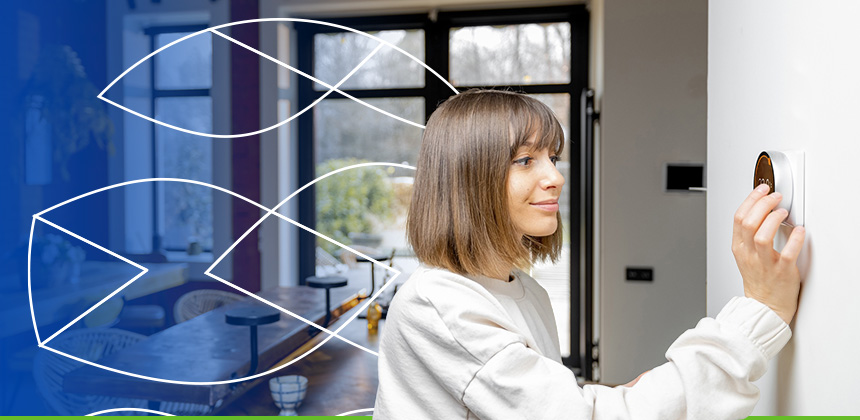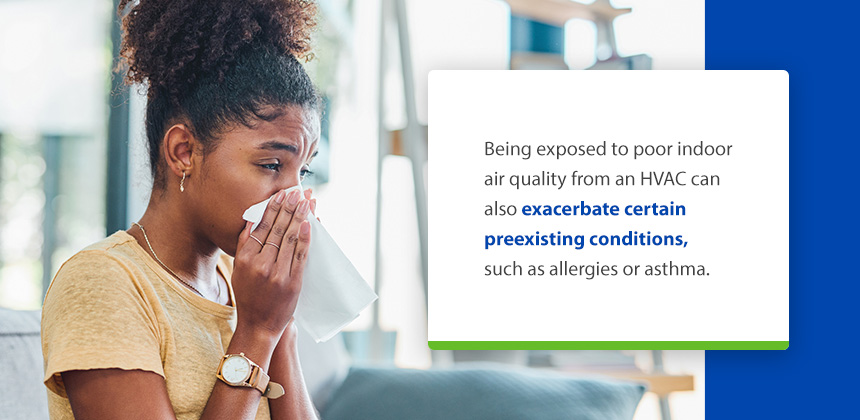

Many people rely on their air conditioners to keep them cool during the summer months. While your air conditioner can make you feel more comfortable, it can also make you feel sick without the proper care. AC illness can cause allergy symptoms and worsen respiratory conditions, significantly impacting your health and comfort.
Homes and businesses with cooling systems may have a higher risk of occupants experiencing air conditioning sickness. With the proper maintenance plan, you can help improve your comfort during summer without worrying about getting sick from your cooling system.
It’s that time of year again when the air is so hot and stifling that you crave the relief of walking into a cool, air-conditioned building or home. Your unit works well and keeps your house cool on the hottest days, so no worries, right? WRONG.
Your air conditioning unit could become a health hazard to you and your family. You wouldn’t drive your car for 50,000 miles without changing the oil. The same should apply to servicing your HVAC unit. The months of June, July, and August will be sweltering.
If you’re relying on your HVAC system during the summer, it’s essential to keep it maintained. The efficiency and longevity of your HVAC system depend on how well and often you maintain it. A lack of maintenance can have dire adverse health effects for you and your family.
Believe it or not, your AC can make you sick. Air conditioning sickness isn’t typically a severe or dangerous condition for most people. A well-maintained air conditioner and filter are more likely to improve air quality in your home or business than worsen it. Likewise, improperly maintained air conditioners and filters can worsen existing symptoms and create new symptoms for otherwise healthy individuals.
Sick building syndrome (SBS) refers to when building residents develop acute health effects caused by spending time inside a building. SBS is typically caused by poor ventilation or a dirty filter, which contributes to poor indoor air quality. The symptoms can also be caused by mold, mildew, fungi or bacteria.
People experiencing SBS may experience worsening symptoms in particular rooms or spaces in their homes or businesses. Being exposed to poor indoor air quality from an HVAC can also exacerbate certain preexisting conditions, such as allergies or asthma.

Some indicators of SBS and air conditioning sickness include:
While these symptoms may feel like a regular cold at first, experiencing them over weeks or months can indicate SBS, especially when you can trace the symptoms back to a source. If you feel better after leaving your office, for example, you may have a case of AC illness on your hands.
A more severe effect of dirty HVAC filters is Legionnaire’s disease. The disease is not spread from person to person but instead through the mist produced by HVAC units. It is a severe form of pneumonia. An infection in your lungs causes them to become inflamed, hinder breathing and cause a harsh cough. Why put your family at risk for something that is so easily prevented?
By taking proper care of your building’s HVAC system, including maintaining and servicing your AC unit when necessary, you can create better indoor air quality that leads to a healthier environment for your family or staff. Ignoring HVAC issues for too long can create an unhealthy space that makes your loved ones or employees sick.
HVAC units work simply: they produce cool air and circulate it throughout your home. The hazards occur when the air circulated throughout your home becomes contaminated, or the equipment in your unit becomes bacteria-ridden. How does this happen?
Lack of maintenance! Imagine a vacuum cleaner being used for months on end without emptying the canister. It becomes congested with dust and dirt and works much less efficiently. Sometimes, the vacuum will even spit some of the dust and dirt back out onto your floors.
The filters in your HVAC unit get clogged with dust and dirt similarly. These clogged filters result in polluted air being generated throughout your home. The filters should be changed every 30-90 days, depending on the style of the filter and the number of pets in your home. You can change these filters yourself or contact a certified Shipley technician for assistance.
When your air conditioner is on, any mold, mildew, bacteria, and other allergens in the home get airborne. You can end up breathing this airborne matter in, and since the air conditioner can also dry out the air, it can irritate your nose and throat as well. If you’re indoors all day, eventually, this can make you feel ill.
Worse, the condensation produced by HVAC units in the drain pan could cause mold and fungus to grow. As this fungus grows within your unit, its particles are being distributed in your home, and you, your family, and your animals are being exposed. The mold could make people in your household sick as it proliferates in the pan. Even if you don’t see the mold, if there is an odor, it could still be there.
When you spend a lot of time in an air-conditioned space, you can often prevent feeling unwell with these tips:
If you have any air conditioning sickness symptoms that are severe or seem to last, see a doctor for a proper diagnosis.
Regular maintenance on your air conditioner and changing your filter can prevent you and your family from getting sick. A well-maintained air conditioner can help filter out the pollutants responsible for worsening existing symptoms or creating new ones. If someone in your home or business struggles with respiratory conditions, it’s even more essential to keep your air conditioner in good shape to maintain good air quality.
If you need maintenance conducted on your air conditioning unit to help improve your home’s or business’s indoor air quality, contact Shipley Energy to speak to a professional. We can help you keep your air conditioner safe and healthy to create a better indoor environment.